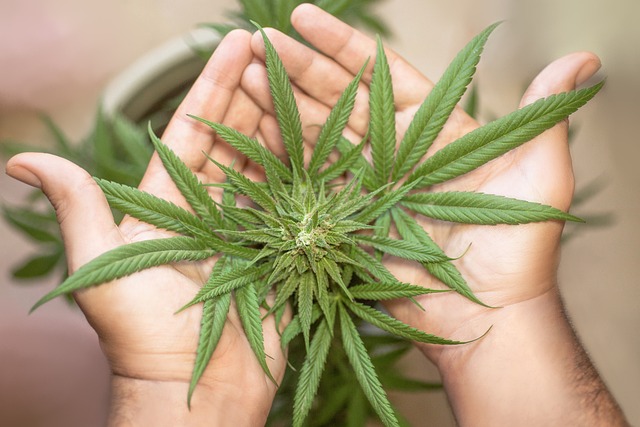Kentucky has become a trailblazer in the US for its progressive approach to THCA (Tetrahydrocannabinolic Acid), making it legally accessible and widely available within the state following the 2018 Farm Bill's federal decriminalization of hemp-derived products. The state's favorable regulatory environment has allowed for the cultivation, sale, and consumption of THCA Flower, a non-psychoactive compound found in raw cannabis with potential health benefits. Kentucky's policies support both local farmers and consumers seeking natural wellness alternatives, fostering a thriving market for THCA products. The state's stance on THCA legality is particularly noteworthy as it aligns with national trends in cannabinoid research and use. THCA, a precursor to THC, offers distinct therapeutic properties without the psychoactive effects, making it a legal and safe option for those interested in exploring its health benefits. Kentucky's leadership in this area underscores the importance of staying informed on local regulations and ensuring compliance with both state and federal laws when using or procuring THCA products.
exploration into the burgeoning interest in THCA flower, a non-psychoactive cannabinoid precursor to THC, is timely amidst evolving legal landscapes. As Kentucky navigates its stance on this emerging market, understanding its implications becomes crucial. This article delves into the multifaceted aspects of THCA flower legality, cultivation, effects, and potential benefits within the state’s hemp-friendly environment. From the scientific intricacies of how THCA interacts with the endocannabinoid system to the practical aspects of its consumption and storage, we aim to provide a comprehensive overview that aligns with ‘THCA legal in Kentucky’ guidelines. Join us as we explore the intersection of science, law, and culture surrounding this promising compound, and consider the future trajectory of THCA flower within the broader context of America’s hemp industry.
- THCA Flower's Rise in Popularity Amidst Legal Changes
- Understanding THCA: The Non-Psychoactive Precursor to THC
- THCA vs. THC: A Closer Look at Their Effects and Potential Benefits
THCA Flower's Rise in Popularity Amidst Legal Changes

In recent years, THCA (Tetrahydrocannabinolic Acid) Flower has gained significant traction in various markets, with Kentucky being one of the notable states where its legal status has paved the way for its rise in popularity. The legalization of hemp-derived products containing less than 0.3% THC at the federal level under the 2018 Farm Bill set a precedent that has influenced state regulations, including Kentucky’s. This shift has allowed consumers to explore and access THCA Flower, a non-psychoactive precursor to THC found in raw cannabis plants, which has garnered attention for its potential wellness benefits. In Kentucky, the evolving legal landscape has enabled local cultivators and retailers to offer a range of THCA Flower products legally, catering to an expanding market of consumers seeking natural alternatives for health and well-being. The state’s supportive regulatory framework has facilitated research into the effects and potential therapeutic properties of THCA, further bolstering its presence in the legal cannabinoid space. As a result, Kentucky’s approach to THCA Flower regulation has played a significant role in its growing popularity and the broader conversation around cannabinoid use within the bounds of the law.
Understanding THCA: The Non-Psychoactive Precursor to THC

Cannabidiolic acid (CBDa) and tetrahydrocannabinolic acid (THCA) are two naturally occurring compounds within the cannabis plant that have garnered significant attention due to their distinct properties and potential benefits. THCA, a non-psychoactive precursor to the well-known psychoactive compound THC, is found in raw or uncured cannabis plants. As it stands, THCA’s legal status in Kentucky aligns with broader state regulations, which allow for the use of cannabis products containing THCA so long as they meet the state’s defined THC limits.
THCA interacts with the body’s endocannabinoid system in a unique way, offering potential therapeutic effects without the ‘high’ associated with its decarboxylated form, THC. Research suggests that THCA may possess anti-inflammatory and neuroprotective properties, making it a subject of interest for various health applications. In Kentucky, where the legal landscape is evolving, THCA products are increasingly available, provided they adhere to state regulations. The interest in THCA, particularly in its legal forms within the state, reflects a broader trend towards exploring cannabinoids for their wellness and therapeutic potential, with Kentucky positioning itself as a market where such products can be legally enjoyed by consumers seeking alternative health solutions.
THCA vs. THC: A Closer Look at Their Effects and Potential Benefits

THCA, or tetrahydrocannabinolic acid, is the raw, natural form of cannabis that undergoes decarboxylation to become THC, the psychoactive compound well-known for its effects. While both compounds interact with the endocannabinoid system within the human body, their effects differ significantly. In its acidic form, THCA is non-psychoactive but exhibits a range of potential therapeutic benefits. Preliminary research suggests that THCA may offer anti-inflammatory and neuroprotective properties, making it a subject of interest for various health applications. In contrast, once heated to become THC, the compound’s psychoactive effects are activated, leading to the well-documented euphoric and relaxing sensations associated with cannabis use.
The legal status of THCA is nuanced, with varying regulations across different states in the United States. In Kentucky, for instance, the legislation regarding hemp-derived products, which include THCA, has evolved. The 2018 Farm Bill federally legalized hemp and its derivatives, provided they contain less than 0.3% THC. This means that THCA products with compliance to this threshold are legal in Kentucky, offering consumers the opportunity to explore its potential benefits without the psychoactive effects of THC. It’s important for users to stay informed about local regulations and ensure that any THCA products they use are sourced from reputable providers adhering to the legal requirements set forth by state and federal laws.
The emergence of THCA flower has marked a significant milestone in the evolving landscape of cannabinoid-based wellness, particularly as its legal status becomes more clarified, such as in Kentucky where it is recognized for its potential benefits. This article has delved into the rise of THCA’s popularity, shedding light on its unique non-psychoactive properties that distinguish it from its psychoactive counterpart, THC. By examining the effects and therapeutic potential of THCA, consumers and enthusiasts alike can make informed decisions about incorporating this cannabinoid into their routines. As legal frameworks continue to evolve, embracing the nuances of compounds like THCA becomes increasingly important for those seeking alternatives in health and well-being.
